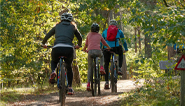Active babies and active toddlers
The project looked at the Wales Active Early Years movement and play activity programme which is delivered to parents and their children across Wales. It is available in English and in Welsh. Each week parents attend a session, either online or in a local community space where a project leader introduces that week’s theme and activities. These are often linked to nursery rhymes or stories, like marching with the Grand Old Duke of York, and there are activity cards for parents to take away at the end of the session so they can continue and develop the movements at home. Here are examples of the cards:

Getting parents involved
An important part of the project was getting parents to join in with the physical activities. Often when parents take their children to groups or places that support physical activity, like soft play centres, the children are being active but the parents are separate and do not or cannot get involved. The Wales Active Early Years project put parents at the centre, showing them how they can lead the activity and encouraging them to be active outside the sessions too.
Positive outcomes for everyone

As part of the project’s evaluation parents were asked to complete questionnaires measuring their levels of physical activity and wellbeing at the start and end of the programme. Analysis of their responses showed that 75% of parents who completed the programme had increased their physical levels by an average of an hour a day and 71% of parents showed an improvement in their wellbeing scores, which was still apparent 12 months later.
It’s not about being ‘sporty’
One of the aims of the programme was to set families off onto a lifelong ‘physical literacy’ journey. Physical literacy is all about supporting everyone to develop a lifelong love of movement, helping them to be active wherever and however they want to. An important aspect of this is recognising that physical activity is not the same as sport. Feedback from parents involved in the project showed that they had become more aware of physical literacy, recognising that everyday physical activity had the same beneficial outcomes as organised activities such as sports, with the added bonus that they didn’t need to have specific equipment or go to particular locations at set times to get involved. This was important because the perception that getting physically active meant participating in organised sport had been identified as a barrier to participation, particularly for families in deprived communities (Khanom et al, 2019).
What next?
Although the project showed positive outcomes for the parents involved, more than 90% of these were white mums so there is more work needed to increase the involvement of dads and parents from other ethnic groups. The findings also showed that families wanted to carry on taking part in physical activity sessions when they had completed the programme but often the only next steps they could find were linked to sports, which was not what they wanted. The project is ongoing so hopefully more and more families will get the benefits of being active together.







Rate and Review
Rate this article
Review this article
Log into OpenLearn to leave reviews and join in the conversation.
Article reviews